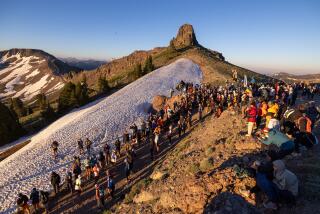Young Glendora cyclist gears up for his next Pacific-to-Atlantic race
- Share via
It was a grueling 11 days, but before Chris Kostman crossed the finish line, he was figuring out the logistics for next year’s Race Across America.
Sleeping only two hours a night and stopping as infrequently as possible, the 20-year-old Kostman, of Glendora, pedaled 3,127 miles across the continent last summer on his 14-speed Nishiki bicycle to become the youngest person ever to finish the race.
He relaxed for a few days, then drove the 3,127 miles back over the race route, assessing and analyzing his performance, just for the fun of it.
Since the race, Kostman said, “everything seems easier. . . . I’m more confident, more determined.”
Even for a dedicated cyclist, the long hours were difficult for Kostman.
“That was my hardest thing, staying on my bike forever. It really stinks having to sit on your bike for 21 hours (every day),” he said, laughing.
But Kostman sat it out for 10 days, 23 hours, 58 minutes and 30 seconds to finish ninth in a field of 26 men and seven women.
According to John Marino, its executive director, Race Across America, which has been held the last six years, is one of the most demanding contests anywhere.
The race requires mental as well as physical strength, Marino said, and Kostman excelled, especially for someone his age.
“He can mentally break the event down and make it manageable,” Marino said. “He has the ability to have fun and enjoy the process.”
Kostman, accompanied by a 12-person crew, found the terrain between the Pacific and Atlantic sometimes breathtaking, sometimes bone-wearying.
“It was pretty mind-boggling. A lot of people haven’t even driven it,” he said.
For Kostman, the best parts of the trip were some of the most difficult. He likes riding up steep hills, so the Colorado Rockies were a highlight.
In Nevada the racers traversed 10 mountain passes, which went better for Kostman than the many up-and-down hills of West Virginia, he said.
The race began in San Francisco’s Golden Gate Park, went up to Sacramento, over to Carson City, Nev., on to Provo, Utah, through Denver; Topeka, Kan.; Indianapolis; Columbus, Ohio; West Virginia and Virginia, and ended at the Washington Monument in Washington.
A big mental lift came when he crossed the Mississippi River in St. Louis. “Once you hit the Mississippi, you’re practically there,” Kostman said. After that, the states became smaller and it was easier to see progress.
“From Mississippi on, it went really fast,” he said. “One minute you’re in Indiana and the next you’re in Ohio.”
Kostman expected the end of the race to be smooth, but it turned out to be one of the most frustrating parts.
The last 100 miles covered rough terrain, and the final 25 were the worst, he said, because he had not slept for about 36 hours. Kostman collected himself, pressed to the finish and reached the end just 90 seconds under a full 11 days.
Kostman began gearing up for the trip more than two years ago, when he first qualified for the race by finishing the 700-mile John Marino Open West race in Hemet.
He was a senior at Glendora High School at the time and did not feel ready to undertake a project that involved raising about $10,000 to cover expenses.
Racers travel with a motor home and two small vans, plus a 10- to 12-man crew, including family, friends and racing experts.
Instead, that year Kostman officiated in the race, driving along the route and checking to make sure race and safety regulations were observed.
He qualified for this year’s race by finishing seventh in an ultra-marathon race in Arizona in which cyclists climbed at least 20,000 feet.
Kostman took up cycling at age 15, when he was a high school freshman. At 16, he began entering 200-mile races, and the next year, with the encouragement of ultra-marathon promoter Marino, he set a record of 31 hours and 13 minutes for the ride from San Francisco to Los Angeles.
That record was broken a week later, but he went on to set others, including the Trans California run, from Huntington Beach to Blythe, and the Death Valley Double Cross.
Kostman, a sophomore at UC Berkeley majoring in political science, approaches his sport as a business. He has formed a corporation called SFLA and works every day to line up sponsors for next year’s race.
“It’s like going to work and having a regular job,” Kostman said.
His sponsors include Nishiki, which provides him with bicycles and other equipment, and several local firms and civic organizations that provided the $10,000 for this year’s race.
Tim Harris, vice president and general manager of the Imperial Savings Assn. branch in Glendora, said it was Kostman’s presentation of himself that persuaded the savings and loan to put up more than $6,000 for the race.
“I was interested in him as a person and what makes him tick,” Harris said. “It is not something your average person would do.”
Kostman has already begun training for next year’s race. He rides to and from school and enters riding events on weekends. In March, he will enter the 200-mile Iditarod Mountain Bike Race across the snow in Alaska.
Always assessing and reassessing what he needs to do, he plans to revamp his strategy for next year’s Race Across America, working to become better prepared going into the race and more efficient during it.
“I think I can win next time,” he said.
More to Read
Go beyond the scoreboard
Get the latest on L.A.'s teams in the daily Sports Report newsletter.
You may occasionally receive promotional content from the Los Angeles Times.










